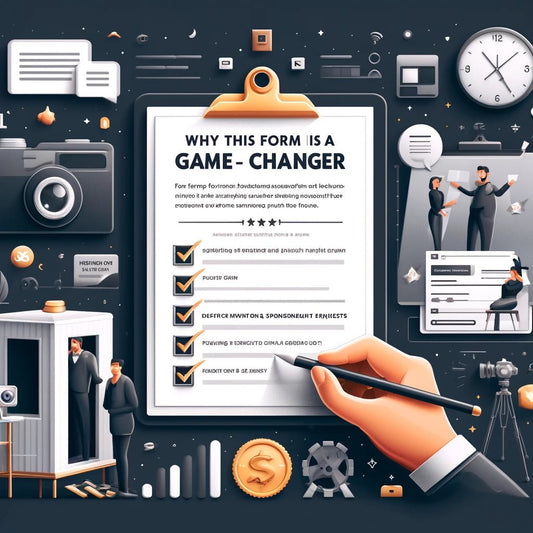
The Ultimate Guide to Corporate Event Marketing Strategies
Share
.jpg)
What Is Corporate Event Marketing?
Corporate event marketing is more than just organizing conferences and gatherings. It's about creating impactful experiences that leave a lasting impression. In this section, we'll dive into the world of corporate event marketing and uncover its definition, importance, and the crucial role it plays within the corporate environment. We'll also explore the social and economic significance of these events, backed by relevant facts and figures that demonstrate their value. Prepare to be enlightened on the power of event marketing in the corporate landscape.Definition and Importance of Corporate Event Marketing
Corporate event marketing is the utilization of events to promote and enhance a company's brand, products, or services. It plays a crucial role in the corporate environment as it helps build brand visibility, establish industry authority, generate leads and increase sales, and strengthen client relationships. Trade shows, conferences, product launches, and sponsorships are some common types of corporate events used for marketing purposes. Effective planning and execution, along with the utilization of digital marketing techniques, are essential for success. Tracking attendance, analyzing lead generation and brand perception, and assessing customer feedback are key in measuring the success of corporate event marketing. The definition and importance of corporate event marketing cannot be overstated, as it is a strategic tool that yields significant benefits for companies.
Role of Events in the Corporate Environment
Events play a crucial role in the corporate environment by providing numerous benefits to businesses. The role of events in the corporate environment is significant as they offer opportunities for networking, allowing companies to connect with potential clients, partners, and industry professionals. Events also facilitate knowledge sharing and learning through conferences, seminars, and educational sessions. Moreover, events create a platform for showcasing products and services, leading to increased brand visibility and awareness. Additionally, events foster team building among employees, enhancing collaboration and communication within the organization. Ultimately, events contribute to the overall success of corporate marketing strategies by providing a platform for engagement, education, and relationship-building.
Social and Economic Significance of Corporate Events
Corporate events play a vital role in society, both socially and economically, due to their immense significance. These events not only provide networking opportunities, but also facilitate knowledge-sharing and stimulate local economies. In particular, trade shows and conferences enable professionals to connect, exchange ideas, and create business prospects. Moreover, corporate events generate employment opportunities, support local businesses, and contribute to the growth of tourism. From a social perspective, these events encourage team building activities, promote the sharing of best practices, and offer educational opportunities. For businesses, corporate events serve as platforms for brand activations, marketing communications, and the introduction of new products. Consequently, companies should acknowledge the value that corporate events bring as they are instrumental in fostering growth and achieving success.
Pro-tip: To maximize both the social and economic benefits of organizing a corporate event, it is advisable to collaborate with local vendors and incorporate initiatives related to corporate social responsibility (CSR).
Why Is Corporate Event Marketing Important?
To truly thrive in today's competitive business landscape, it's crucial to understand the power of corporate event marketing. In this section, we'll dive into why corporate event marketing is so important, uncovering the secrets behind building brand visibility and awareness, establishing industry authority, generating leads and increasing sales, and strengthening client and customer relationships. With these insights, you'll discover the immense value that well-executed corporate events can bring to your business, fueling growth and success in ways you never thought possible.Building Brand Visibility and Awareness
Building brand visibility and awareness plays a pivotal role in corporate event marketing. It is vital for companies to establish a strong presence and attract potential customers. Here are some effective strategies to successfully achieve this:
- Make optimal use of social media platforms to promote the event and actively engage with the target audience.
- Collaborate with influencers or industry experts to significantly enhance brand exposure.
- Create visually captivating and informative content to seize attention and showcase the brand effectively.
- Offer distinctive experiences or interactive activities that effectively demonstrate the brand's products or services.
- Participate in trade shows or exhibitions to introduce the brand to a wider audience.
- Employ strategic partnerships or sponsorships to align the brand with other reputable companies or events.
- Utilize email marketing campaigns to reach a broader audience and generate interest in the event.
- Provide promotional merchandise to attendees, such as branded giveaways, to increase brand visibility well beyond the event.
Establishing Industry Authority
Establishing industry authority is essential when it comes to corporate event marketing. It plays a crucial role in helping companies position themselves as leaders in their respective fields and gain credibility among their target audience. To establish industry authority effectively, here are some key strategies to consider:
- Thought leadership: Engage in educational sessions or workshops to share valuable insights, industry trends, and expertise.
- Partner with industry experts: Collaborate with influential individuals or organizations to co-host events or participate as knowledgeable speakers.
- Showcase success stories: Highlight successful projects or partnerships through case studies or testimonials to demonstrate expertise and capability.
- Participate in industry events: Attend trade shows, conferences, and exhibitions to network with peers, stay updated with the latest trends, and showcase innovative products or services.
- Contribute to industry publications: Publish research papers or write articles in industry publications to assert authority and foster knowledge-sharing.
Generating Leads and Increasing Sales
To effectively generate leads and increase sales, companies can employ the following proven steps in their corporate event marketing:
Create an engaging and captivating event theme or concept that resonates with the target audience's specific interests.
Devise a targeted marketing strategy that encompasses the promotion of the event through diverse channels, including email marketing, social media, and industry publications, to reach a wider audience.
Incentivize attendee registration and active involvement by offering attractive perks, such as exclusive access or discounts.
Forge strategic partnerships with influential industry figures or thought leaders to attract a larger and more diverse audience.
Craft informative and captivating content sessions that not only address attendees' pain points but also deliver valuable insights and practical solutions.
Create opportunities for networking to enable attendees to connect with potential clients or partners, facilitating the generation of leads.
Implement exciting product demonstrations or interactive experiences to effectively showcase the key benefits and features of your offerings.
Gather comprehensive attendee data and follow up with personalized communication tailored to nurture leads and convert them into actual sales.
Evaluate the success of your event marketing efforts by closely monitoring attendee conversion rates, revenue generated, and customer feedback.
Strengthening Client and Customer Relationships
Strengthening client and customer relationships is a crucial aspect of corporate event marketing. It plays a vital role in fostering loyalty, improving retention rates, and generating referrals. Here are some effective strategies for achieving this goal:
By implementing these strategies, businesses can cultivate stronger connections with their clients and customers, leading to long-term partnerships and mutual success.
Types of Corporate Events for Marketing Purposes
Looking to make a splash with your corporate event marketing? Look no further! In this section, we'll explore the diverse array of marketing opportunities that different types of corporate events offer. From trade shows and exhibitions, to conferences and seminars, product launches, and corporate sponsorships and charity events - we've got you covered. Get ready to dive into the exciting world of corporate event marketing, where creativity and connections combine for business success!Trade Shows and Exhibitions
- Trade shows and exhibitions play a crucial role in corporate event marketing. They provide excellent opportunities for companies to showcase products, network with industry professionals, and generate leads.
- Increased exposure: Participating in trade shows and exhibitions allows businesses to reach a wider audience and gain visibility in the industry.
- Networking: These events offer valuable networking opportunities, enabling companies to connect with potential clients, partners, and suppliers.
- Market research: Trade shows and exhibitions provide insights into current market trends, competitors' offerings, and customer preferences.
- Product demonstrations: Exhibiting at trade shows and exhibitions allows companies to demonstrate the features and benefits of their products directly to potential customers.
- Lead generation: Trade shows and exhibitions are an effective way to generate qualified leads and expand a company's customer base.
True history: One of the most famous trade shows and exhibitions, the Great Exhibition of 1851, showcased innovative products from around the world and was an iconic event in the history of industrialization. It paved the way for modern trade shows and exhibitions, demonstrating the power of bringing businesses together to showcase their innovations and foster economic growth.
Conferences and Seminars
Conferences and seminars are pivotal corporate events for marketing purposes. They serve as essential platforms for industry professionals to convene, exchange knowledge, and establish connections. Conferences provide educational opportunities by featuring speakers who present case studies and share best practices. On the other hand, seminars focus on specific subjects, enabling participants to delve deeper into learning and skill enhancement. These events significantly contribute to brand activations and marketing communications, emphasizing a company's expertise and thought leadership. Trade shows are often integrated into conferences, offering networking prospects and the chance to showcase products and services. Moreover, incentive travel may be included as a means to recognize and reward top performers. Conferences and seminars play an indispensable role in the landscape of corporate event marketing.
In history, one noteworthy conference was the 1787 Constitutional Convention in Philadelphia. This gathering brought together delegates from throughout the United States and paved the way for the creation of the U.S. Constitution, laying the foundation for American governance that endures to this day. The constitutional debates and discussions that took place during the convention were crucial in shaping the future of the nation.
Product Launches
Product launches play a vital role in the realm of corporate event marketing. They offer businesses a valuable opportunity to introduce their latest products to the intended audience and generate significant buzz around their brand. When aiming for a successful product launch, it is essential to consider the following key factors:
1. Strategic Planning: Precise outlining of objectives, target audience, and core messaging well before the actual event is crucial.
2. Generating Excitement: Captivate attendees by incorporating creative presentations, demonstrations, and interactive experiences.
3. Influencer Collaboration: Collaborating with influencers or industry experts can greatly enhance the impact and reach of the product launch.
4. Embracing Technology: Leveraging digital tools such as live streaming or virtual reality can broaden the scope of the product launch and attract a wider audience.
5. Post-launch Follow-up: Ensure the momentum generated by the launch is sustained by nurturing leads and actively seeking feedback from customers.
By executing a meticulously planned product launch strategy, businesses can effectively maximize their marketing endeavors and successfully introduce their new offerings to the market.
Corporate Sponsorships and Charity Events
Corporate sponsorships and charity events offer companies the opportunity to make a positive impact on society while also promoting their brand. Here are some key benefits of engaging in these types of corporate events:
- Enhanced brand reputation: Associating with corporate sponsorships and charity events demonstrates a company's commitment to social responsibility.
- Increased brand visibility: Through corporate sponsorships and charity events, companies gain exposure to a wider audience, increasing brand recognition and awareness.
- Stronger customer relationships: By aligning with causes that resonate with their target audience, companies can foster stronger emotional connections with their customers.
- Networking and partnership opportunities: Corporate sponsorships provide valuable networking opportunities and the chance to form collaborations with like-minded organizations and individuals.
- Positive employee morale: Involving employees in corporate sponsorships and charity events boosts morale and creates a sense of pride and purpose within the organization.
Planning and Execution of Corporate Event Marketing
When it comes to planning and executing corporate event marketing, there are key elements that can make all the difference. We'll dive into each one, ranging from setting clear objectives and goals, to choosing the right venue and event format. Let's also explore the importance of developing a comprehensive marketing strategy and leveraging digital marketing techniques to maximize reach and engagement. Get ready to take your corporate events to new heights!Setting Clear Objectives and Goals
Setting clear objectives and goals is absolutely essential for the successful marketing of corporate events. It is crucial because it ensures that your event is in line with your overall marketing strategy, and it allows you to effectively gauge its success. To help you with this process, here are some steps to follow when establishing objectives and goals for your corporate event:
- Identify the purpose of your event: It is important to determine why you are organizing the event and what you hope to achieve.
- Define specific and measurable goals: Make sure to set clear targets that can be easily measured, such as the number of attendees, leads generated, or sales increase.
- Align objectives with your target audience: Take into account the needs and expectations of your target audience, and tailor your goals accordingly.
- Create a timeline: Establish a timeline for achieving each objective, including pre-event, during the event, and post-event activities.
- Allocate resources: Determine the necessary resources, such as budget, staff, and technology, to effectively accomplish your objectives.
- Evaluate progress: Regularly monitor and evaluate your progress in meeting your objectives, and make any necessary adjustments along the way.
The company's successful organization of a product launch event was greatly aided by the establishment of clear objectives and goals. With a specific target of generating 100 leads, they implemented strategies such as targeted invitations and interactive demonstrations. Through the measurement of leads generated and subsequent conversions, they not only met but exceeded their goal, resulting in a significant 30% increase in sales.
Choosing the Right Venue and Event Format
Choosing the right venue and event format is crucial for the success of corporate event marketing. Here are some factors to consider:
- Type of event: Different events necessitate distinct venues and formats. When organizing conferences and seminars, opt for a spacious venue with sufficient seating and audiovisual capabilities. Trade shows and exhibitions, on the other hand, might require a larger space with booths for exhibitors.
- Location: Take into account the accessibility of the venue for attendees and ensure that it aligns with your target audience. A centrally located venue or a destination that provides unique experiences can attract more participants.
- Ambience and atmosphere: The chosen venue should reflect the desired mood of the event. Determine whether a formal setting, a casual environment, or a themed venue would be most suitable.
- Budget: It is essential to ensure that the venue and event format align with your budget constraints. Consider the rental cost of the venue, as well as any additional expenses for decor, catering, and audiovisual requirements.
- Event logistics: Evaluate the capacity, layout, and facilities of the venue to accommodate the activities planned for your event, such as breakout sessions, networking areas, or exhibition space.
- Technical requirements: Assess whether the venue has the necessary infrastructure and technical support for your event, including audiovisual equipment, Wi-Fi access, and power outlets.
Developing a Comprehensive Marketing Strategy
- Developing a comprehensive marketing strategy is crucial for the success of corporate event marketing. Here are some key steps to consider:
- Set clear objectives and goals: Define what you want to achieve with your event and align them with your overall marketing goals.
- Choose the right venue and event format: Select a venue that matches your brand image and target audience. Consider the event format that best conveys your message.
- Outline your promotional activities, including social media campaigns, email marketing, and content creation.
- Leverage digital marketing techniques to reach a wider audience, engage with participants, and drive registration.
By following these steps, you can create a well-rounded marketing strategy that maximizes the impact of your corporate event.
Utilizing Digital Marketing Techniques
Utilizing digital marketing techniques is crucial for successful corporate event marketing. To effectively leverage digital channels, here are some strategies:
| - Create a compelling event website with clear and engaging content. |
| - Utilize social media platforms to promote the event, interact with attendees, and generate buzz. |
| - Implement email marketing campaigns to reach out to target audiences and provide event updates. |
| - Use paid online advertising to increase event visibility and attract a larger audience. |
| - Employ video marketing to showcase event highlights and generate excitement. |
Pro-tip: Incorporate data analytics to track digital marketing efforts and make data-driven decisions to optimize future event promotions.
Measuring the Success of Corporate Event Marketing
When it comes to corporate event marketing, measuring success is key. In this section, we'll dive into the various ways to evaluate the effectiveness of your efforts. From tracking attendance and engagement, to analyzing lead generation and conversion rates, and assessing brand perception and customer feedback, we'll uncover the insights you need to understand the impact of your corporate events. No more guesswork, it's time to measure and optimize for success!Tracking Attendance and Engagement
Tracking attendance and engagement at corporate events is essential for evaluating their success and making informed decisions for future marketing efforts. To effectively track attendance and engagement, you can employ the following strategies:
| - Event registrations: | Keep a record of the number of individuals who register for the event. |
| - Check-ins: | Utilize electronic check-in systems or manual sign-ins to document attendance. |
| - Tracking app usage: | Monitor the number of downloads and usage of event-specific mobile apps. |
| - Surveys and feedback forms: | Gather attendee feedback to assess overall satisfaction and engagement levels. |
| - Engagement metrics: | Monitor metrics such as social media mentions, shares, and interactions to evaluate attendee engagement. |
Analyzing Lead Generation and Conversion Rates
- Evaluating the success of corporate event marketing requires a thorough analysis of lead generation and conversion rates. This allows businesses to gain insights into the effectiveness of the event in generating new leads and converting them into valuable customers or clients.
- Set Clear Goals and Objectives: To effectively analyze lead generation and conversion rates, it is important to set clear goals and objectives. By defining specific targets, businesses can accurately measure their success in acquiring leads and converting them.
- Track Attendance and Engagement: Measuring interest levels can be done by tracking attendance and engagement during the event. This data provides valuable insights into the level of interest generated, helping businesses understand the effectiveness of their marketing efforts.
- Analyze Lead Generation Metrics: To gauge lead generation success, it is crucial to analyze various metrics, including the number of qualified leads generated. Examining these metrics provides a quantitative measure of the effectiveness of lead generation strategies.
- Evaluate Conversion Rates: Assessing the percentage of leads that successfully convert into customers allows businesses to evaluate their conversion rates. This analysis helps identify the effectiveness of marketing strategies in turning leads into valuable customers.
- Assess Lead Quality and Potential Value: Along with lead generation and conversion rates, it is essential to assess the quality of leads generated and the potential value they bring to the business. This evaluation enables businesses to prioritize leads that have a higher likelihood of becoming valuable customers.
Assessing Brand Perception and Customer Feedback
- Assessing brand perception and customer feedback is crucial in corporate event marketing to measure the effectiveness of the event and make necessary improvements.
- Collect feedback: Gather feedback from attendees through surveys and evaluations to understand their perception of the brand and event experience.
- Analyze data: Analyze the feedback collected and track key metrics such as customer satisfaction, brand image, and likelihood to recommend to assess brand perception accurately.
- Identify areas of improvement: Use the feedback to identify strengths and weaknesses of the event and make adjustments for future events.
- Address concerns: Take actionable steps to address any negative feedback or concerns raised by attendees promptly.
Frequently Asked Questions
What is corporate event marketing and why is it important?
Corporate event marketing is a strategy that involves face-to-face interactions between brands and customers at events like conferences and trade shows. It is important because it provides attendees with the opportunity to form in-person connections in a digital world.
How does event marketing benefit attendees?
Event attendees have a more positive opinion about the company, brand, product, or service being promoted after the event. They also have the chance to network, gain knowledge, and experience new products or services.
What is the role of a clearly defined event marketing plan?
A clearly defined event marketing plan is crucial for the success of an event. It serves as a roadmap, determining the goals, target audience, messaging, and strategies for promoting the event.
What resources and opportunities does CEMA provide for corporate event marketers?
CEMA offers membership, events, and resources for professionals in the corporate event marketing industry. They provide access to exclusive content, networking opportunities, discounts on events and resources, and educational programs such as CEMA study tours.
How can I connect with other professionals in the corporate event marketing industry?
CEMA provides a member directory where you can find and connect with other professionals in the industry. They also offer networking opportunities through events like the annual CEMA Summit and their online platform CEMA Online.
What advantages does CEMA membership offer?
CEMA membership offers advantages such as access to exclusive content, networking opportunities, discounts on events and resources, and professional development opportunities. Members can also access CEMA Online, where they can connect with other professionals and access valuable resources like case studies and white papers.






